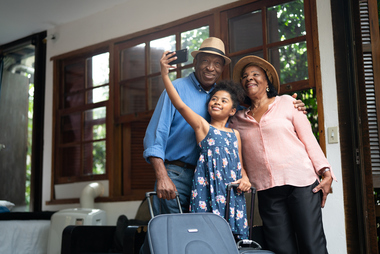Posted in Triplett & Carothers on March 1, 2022
One reason people look forward to retirement is because they’ll have time to travel.
If you’ve only had enough vacation time for a few long weekends a year before, it’s exciting to be able to plan out a real weeks-long vacation.
But travel is different when you’re older. Health and safety concerns that you never would have given a second thought about as a younger person take center stage.
Here are some tips for safer and easier travel as a senior.
- Pack documents. Even if you’re traveling domestically, never leave without your passport and one other form of ID so you can always prove your identity. Bring your insurance card, prescriptions, statements of medical conditions, and a printout of your emergency contacts; keep these in a bag with all your medications in your carry-on luggage.
- Pack light. No matter how carefully you plan, you may find yourself wrangling your suitcase yourself if things go awry. For example, if your flight is changed at the last minute, you may not have time to find assistance before you must run to the other end of the airport. Pack accordingly.
- Sort out your insurance. Not all health insurance covers you when you’re abroad. Medicare, for example, applies in the U.S. only. You can buy travel medical insurance that covers you anywhere for a short time. Travel insurance comes with add-ons like “cancel for any reason” coverage that guarantees a refund if your trip is canceled or changed.
- Seek out elderly accommodations. Trains and planes have special seats for elderly or disabled travelers. These are accessible to people with wheelchairs and walkers, but wheelchair service must often be requested ahead of time; look up the company’s policy ahead of time if indicated.
- Think about safety. You’re always vulnerable to bad actors when you’re a tourist in another city, but older adults are more likely to be seen as marks. Take precautions to avoid looking like a tourist; don’t be obvious about taking pictures or checking a map, especially if you’re alone. Protect yourself from pickpockets and purse-snatchers by not keeping all your money in your wallet. Use a money belt or neck pouch or rely on your credit card if you’ve already informed your bank that you’ll be traveling.
Traveling can be one of the great joys of retirement, but seniors have special considerations. Looking after your safety, health, and comfort when you’re traveling takes care and planning but is well worth your time. Coordinate with medical professionals about any restrictions you may face during your travels.
| SHARE |


